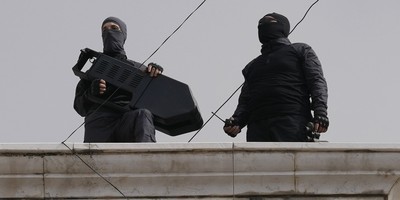Let's imagine that all goes well in Libya. The rebels, protected by air strikes, recapture lost territory and sweep into Tripoli. Moammar Gadhafi and his sons one way or the other disappear.
Leaders propose a democratic and secular constitution that voters overwhelmingly approve. The first act of the duly elected government is to issue a proclamation of thanks and friendship to the United States, Britain, France and others who prevented Gadhafi's mass slaughter.
Well, we can all dream, can't we?
But in the cold light of day, none of these happy eventualities seems very likely. As one who hopes for success in this enterprise, I am dismayed by the contradictions in the course we are following.
Some three weeks ago, Barack Obama said Gadhafi "must go." But the United Nations Security Council resolution under which we are acting stops well short of this goal.
Joint Chiefs Chairman Adm. Mike Mullen confirmed that Gadhafi may remain in power indefinitely. National Security Council staffer Ben Rhodes said, "It's not about regime change."
If not, then the purported purpose of the operation, to "protect civilians," could be of unlimited duration. Libya might well be divided between a Gadhafi regime in the west around Tripoli and a rebel regime in the east around Benghazi.
Maintaining the existence of the latter will likely require military force. Obama has conceded that the United States is currently in command of operations, but says that command will be handed off to others in "days, not weeks."
But news reports make it clear that the overwhelming majority of military forces in action are American. Putting a British or French officer in command will not change that. And putting U.S. forces under foreign command might weaken support for the enterprise here at home.
Recommended
Obama's policy is reminiscent of the old saying that a camel is a horse designed by committee. The policy satisfies advocates of humanitarian intervention, like the National Security Council's Samantha Power, who remember Bill Clinton's regret that he didn't intervene to stop the slaughter in Rwanda.
Unfortunately, in order to satisfy those who oppose anything smacking of unilateralism, it took time to get the U.N. Security Council to act, so that we missed the moment when it seemed possible that recognition of a rebel government or imposition of a no-fly zone would topple Gadhafi.
That delay gave him time to launch a counterattack that made him strong enough to withstand the limited military action that could get multilateral approval.
By accepting limits on U.S. involvement, Obama aims to satisfy skeptics of military action, like Defense Secretary Robert Gates, who publicly pointed out the difficulties of maintaining a no-fly zone. We have seen this before, when Obama announced his surge in Afghanistan together with a deadline for the beginning of troop withdrawals.
The result in Libya is a policy whose means seem unlikely to produce the desired ends.
In the process, this Democratic president has jettisoned some of the basic tenets of his party's foreign policy.
"It is always preferable to have the informed consent of Congress prior to any military action," candidate Obama said in December 2007. But Congress was not informed or, it seems, consulted in any serious way about this decision to take military action in Libya.
Instead, members of Congress, like the general public, heard the president make the announcement in Rio de Janeiro. That's quite a contrast with George W. Bush, who sought and obtained congressional approval of military action in Afghanistan in September 2001 and Iraq in October 2002.
Since then, many Democrats have denounced Bush's "rush to war" in Iraq. But military action there began a full five months after Congress approved. Obama didn't wait five days after the Security Council resolution.
Bush argued that intervention in Afghanistan and Iraq was in the national interest. Obama, who has made the same argument about Afghanistan, doesn't seem to be making it about Libya. For some supporters of his policy, the absence of any great national interest makes it all the more attractive.
It's not likely to remain attractive to American voters if it fails to result in the overthrow of Gadhafi and leads to an open-ended military commitment in a nation where our vital interests are not at stake.
But a better outcome is at least possible. After all, history shows that dreams sometimes do come true.
























Join the conversation as a VIP Member